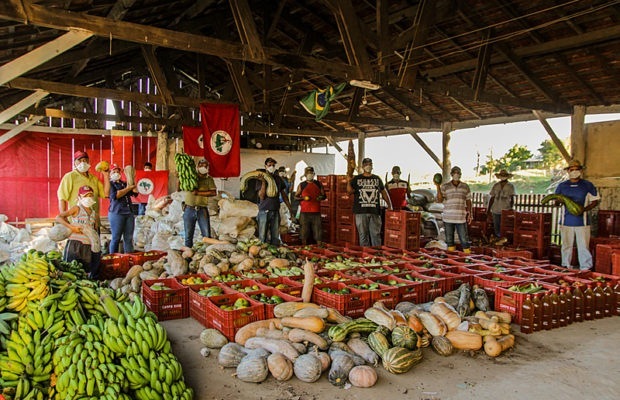RIO DE JANEIRO, BRAZIL – Due to the crisis situation caused by the coronavirus pandemic, the social impact, in particular, is enormous. This is also the case in Latin America.
Over the past few weeks, solidarity initiatives are being developed in many countries to address the impacts of measures such as restrictions on going out of doors.

First and foremost, there are community kitchens and food donations and supplies. Equally plentiful are the initiatives for self-produced protective masks and clothing. The first barter markets are emerging again.
Youths are organizing in groups to run errands for their elderly neighbors or to bring a warm lunch home for them. In Chile, white cloths often hang from the windows as a cry for help to find assistance.
In Mexico, the “I’m running errands” platform directs volunteers to where they are needed. In Uruguay, the many soup kitchens and food banks can be found on Google Maps.
They automatically display the nearest available institutions. In addition, there are restaurants in every village that have ceased operations and turned into soup kitchens.
Donations from citizens, businesses, and institutions are organized and channeled through the Internet. Sports clubs set up shelters for the homeless, and even football stadiums provide such social amenities.
At Montevideo’s central agricultural market, both agricultural producers and intermediaries donate a balanced daily ration of food for those who live from hand to mouth.
There are still many social projects of this kind in Argentina, dating from the hunger years of the Macri government, which continue to operate. Religious institutions have already distributed up to one million food packages.
In Venezuela too, neighborhood organizations are bringing food packages to the door of homes, enabling quarantine measures for those in need of help, in addition to visits by medical workers.
In Chile, youths involved in the protests of recent months are now disinfecting the subway stations and public transport coaches. Others get up early every day to bake and distribute bread to the poor and elderly.
Initiatives against the exorbitant prices of food have also joined forces in several locations. They drive directly to the farmers in the countryside, buy fruit and vegetables at low prices and sell them far cheaper than the supermarkets.
Some groups think of the day after: they plan to use their experience to develop lasting social projects.
In Brazil, the “Landless Movement” (MST) is proving its ability to produce high-quality, healthy food, free of toxic chemicals, on its occupied rural lands, far beyond its own needs.
Every week they distribute several tons of free food to the needy in urban areas, either occupying vacant buildings or sharing enclaves left vacant among themselves to build their modest shelters.
The Landless Movement also sews hundreds of protective masks every day, which it distributes to the beneficiaries of its donations.
The MST Maila Sabrina Camp, comprising some 360 families, has occupied 10,600 hectares of fallow land and converted it into a thriving agricultural area. It supplies hundreds of families in the industrial city of Curitiba, most recently with 14 tons of food.
“We can live well off the land, thank God, and with quality products. And produce a little more. It is very rewarding for us to be able to provide for someone who needs it,” says a member of the Maila Sabrina community.
In Mexico, in the state of Oaxaca, fishermen donate several tons of fresh fish to the poor population, which is deprived of its daily income as a result of quarantine. The Fishermen’s Association of Oaxaca has set itself the goal of distributing some 20 tons of fish daily.
Anselmo López Villalobos, the association’s president, explained that the central and state governments have proposed a division of labor. “We provide the boats, the infrastructure and the labor, and the state should pay for the fuel costs,” said López Villalobos.
But so far there has been no official reaction. The fishermen have paid for everything out of their own pockets.
“We can raise between 50 and 60 tons of fish and distribute it in the villages and towns along the coast. We hope for the sensitivity of those in power,” he added.
State aid measures began three to four weeks too late – if at all – in most Latin American countries, at least for the millions of people living outside the social safety net.
On the other hand, the rapid and decisive solidarity actions should be highlighted. Solidarity was put into practice in the very first days of the quarantine. The majority of people are aware of what hunger means and that it can be overcome through joint action.

